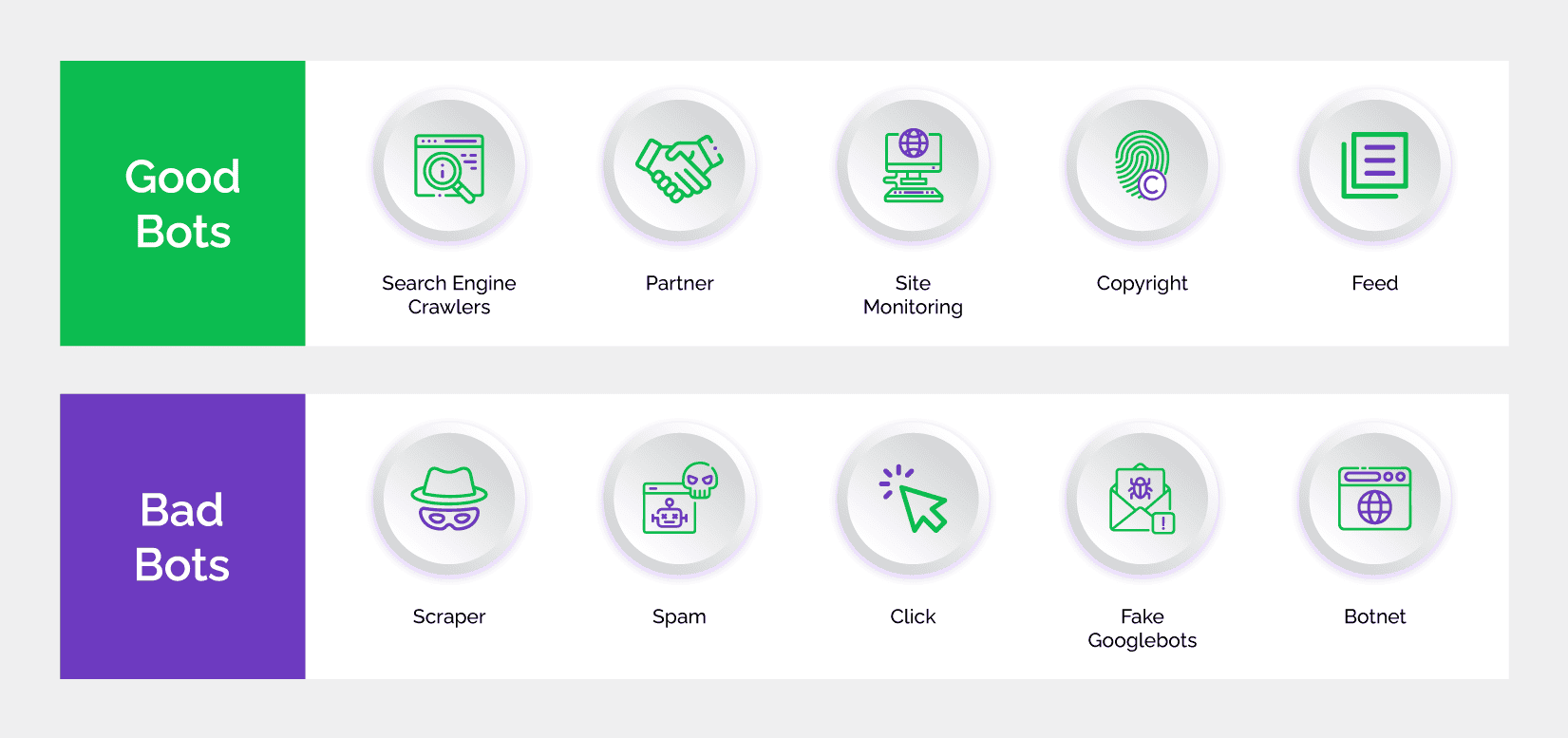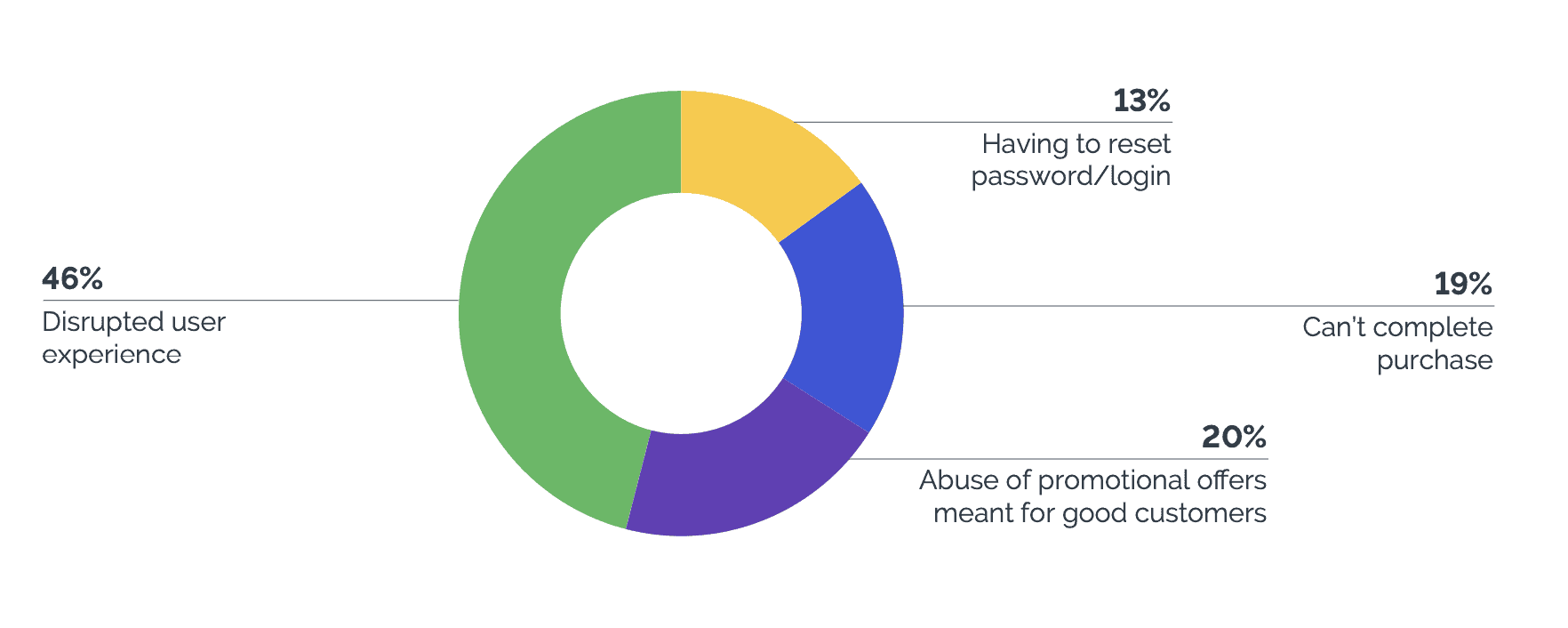Anti-bot software is software that helps secure digital platforms, such as websites, mobile applications and APIs, from automated bot attacks. By powering bot mitigation efforts, anti-bot software helps online businesses prevent malicious bots from harming their digital assets.
Bots have become a popular means of executing complex and targeted attacks because of their ability to quickly scale up complex attacks. This enables bad actors to maximize their returns with the least possible investment.
But bot protection software identifies and blocks bots. It uses a wide range of technologies to do so, including CAPTCHA challenges, machine learning, behavioral analysis, and device fingerprinting, among others. Anti-bot software is especially useful in distinguishing bots from human users and taking appropriate action to prevent bots from accessing a digital property while letting legitimate traffic pass through. It provides analytics and insights into the type and volume of bot traffic on a website, which enables organizations to understand the threats they face and fine-tune their security measures.
Impact and Dangers of Bad Bots
Let’s quickly review what bots are and what they do. Bots are software programs that can perform various automated tasks on the internet at great speed, at scale, and around the clock. Bots can be either good or bad. While good bots help streamline and enhance online experiences, malicious bots can threaten security, privacy, and the reliability of online information.

Examples of good bots include search engine crawlers that index web content, chatbots that provide customer support, social media bots that automate posts and interactions, e-commerce bots that can be used for price comparison, tracking product availability, and purchasing limited-stock items.
On the other hand, malicious bots pose a range of dangers, from data theft and fraud to disrupting services and manipulating online content. These bot attacks include website scraping, carding, credential stuffing, fake new account creation, account takeover, injecting spam or malware, phishing, SMS toll fraud, artificially inflated traffic fraud, spam, distributed denial of service (DDoS attacks), brute force attacks, and so forth. These attacks not only harm businesses and their customers, but also put a strain on infrastructure and operational costs, as security teams have to work harder to fend off these attacks and accurately report on website traffic.
Some common business impacts related to bot attacks from Arkose Labs research are as illustrated in the figure below:

How Does Anti-Bot Software Work?
As web applications and online services become more sophisticated, so do the capabilities of bots to exploit vulnerabilities and disrupt consumers’ online experience. Anti-bot software providers constantly update their algorithms and strategies to keep up with these evolving threats. The anti-bot software industry has grown and diversified, offering a range of solutions for bot management, including cyber defense. Also known as bot detection software or anti-bot, these solutions use several methods, from behavioral analysis and CAPTCHA challenges to machine learning, to improve the accuracy of bot detection and stop the harmful activities of botnets.
Anti-bot software can accurately differentiate between legitimate users and bots, which helps protect data, resources, and user experiences from disruptive and harmful activities. The solutions detect and mitigate automated bot activity on digital platforms by leveraging the power of machine learning algorithms and AI to detect and categorize web traffic in real time and prevent cyberattacks.
Application of Anti-Bot Software Across Industries
Businesses across industries rely on anti-bot software to minimize operational risks, enhance customer trust, and improve the overall user experience. Applications in businesses are diverse and encompass several key areas, as described below:
- E-commerce and retail: Retailers use anti-bot technology to counter e-commerce fraud and prevent bot-driven price scraping to protect their business strategies.
- Financial services: Anti-bot technology helps financial institutions detect and prevent fraud, such as account takeovers and credit card fraud. They also use anti-bot software to ensure a level playing field and compliance with regulations in high-frequency trading.
- Gaming and entertainment: In online gaming, anti-bot software helps detect and prevent cheating through automation.
- Travel and hospitality: Travel platforms use anti-bot software to prevent fraudulent bookings, fake account creation, and account takeover attempts.
- Social media: Anti-bot software helps social media companies keep attackers from creating fake accounts that are used to trick real users and spread their own messages or influence others. Bot software also scrapes data, content, and images.
- Technology: Technology companies use anti-bot technology to protect against many different attack types, including account takeovers, credential stuffing, fake account creations, bonus abuse, and payment fraud.
- The gig economy: Sharing and gig economy organizations use anti-bot software to guard against attackers creating fake profiles and listings, targeting peer-to-peer money transfer services, generating bogus reviews, connecting to APIs, and more.
Use Cases of Anti-Bot Technology
A few examples of the diverse use cases for anti-bot software are:
- Website, App, and API Security: Prevent automated bots from web scraping and stealing sensitive data from websites, mobile apps, and APIs or overwhelming digital platforms with DDoS attacks using non-human traffic. Prevent attempts to exploit vulnerabilities in digital platforms and ensure secure data exchange with third-party services.
- Account Security: Detect and prevent automated bot attacks that use stolen login credentials for credential stuffing and account takeover attacks.
- Compliance and Data Protection: Help businesses comply with data protection regulations by safeguarding user data and preventing data breaches. This enables businesses to comply with data protection regulations like GDPR.
- Chatbot and Customer Support: Manage automated chatbots for customer support while ensuring that malicious bots do not interfere with the service.
- Lead Generation and Online Forms: Prevent bots from filling out lead generation forms with fake or spam data, ensuring the accuracy of lead information.
- Threat Intelligence: Monitor and gather intelligence on emerging bot threats and cybercrime trends according to industries.
Choosing the Right Anti-Bot Software for Your Business
Traditional and legacy bot protection solutions are inadequate for today’s businesses. It is critical that businesses choose the right anti-bot software to adequately protect online assets and ensure the security of digital operations.
Advanced bot protection software should have the following key features:
- Bot Detection Methods: Uses a variety of detection methods, such as behavior analysis, machine learning, device fingerprinting, and CAPTCHA challenges, to accurately identify and stop malicious bot activity on digital platforms.
- Integration and Customization: Easily integrates with existing security infrastructure and is compatible with a variety of web and application platforms. Allows organizations to configure settings to match their specific needs, including adjusting sensitivity levels and defining rules.
- Rate Limiting: Offers rate-limiting functionality to control the number of requests a user or IP address can make within a specific time frame, preventing bots from overloading the server.
- IP Reputation Lists: Maintains databases of known bot IP addresses and reputation scores to block or scrutinize online traffic from untrustworthy sources. Manages lists of known blacklisted bot IP addresses to block and trusted IP addresses to whitelist.
- Real-Time Analysis: Operates in real time to promptly respond to bot threats as they occur and prevent malicious actions before they can cause harm.
- Reporting and Analytics: Provides comprehensive reporting and analytics tools, offering insights into bot traffic patterns, enabling data-driven decisions to respond to the emerging threats, and facilitating compliance with data protection regulations.
- Scalability: Scales to accommodate changes in internet traffic volume and the evolving bot threat landscape, ensuring consistent performance.
- User Experience Optimization: Minimizes false positives to prevent inconveniencing legitimate users with excessive challenges and security checks.
- Cost-Effectiveness: Provides cost-effective solutions that align with business budgets while delivering effective bot protection.
- Vendor Reputation: Comes from a reputable and trustworthy provider with a history of successful bot mitigation, support services and regular updates.
Arkose Labs delivers comprehensive protection from a variety of bot-driven attacks with our best-in-class solution, Arkose Bot Manager. Adopting a unique approach to bot protection, Arkose Labs uses targeted friction in the form of Arkose MatchKey challenges that beat the bots of any advancement level. Learn more about how to detect and stop bots with Arkose Bot Manager.
